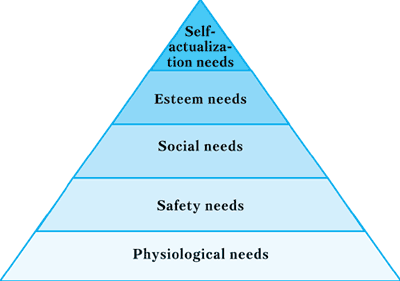Maslow’s Hierarchy of Needs
Abraham Maslow developed a theory in 1943 to analyze what drives human behavior. The Hierarchy of Needs Theory explained human behavior in terms of needs.
His theory’s underlying premise is that people must have their needs met in order to function effectively. These needs are ordered in a hierarchy.
Maslow suggested that human behavior is first motivated by basic physiological needs. That is, you need food, water and air. Providing your employees with a sufficient remuneration, bonuses and breaks during their workday enables them to meet some of these basic physiological needs. Health-care programs, medical insurance and paid sick leaves also assist your employees in meeting these needs.

Once these needs are fulfilled, people are motivated by safety needs. You can provide fulfillment of these needs for your employees by ensuring strict adherence to occupational safety rules and offering them some degree of job security.
Many of the benefits that companies offer, such as savings plans, stock purchase plans and profit sharing programs, also fulfill the safety needs of employees. Even outplacement services to assist employees who were made redundant can address the safety needs: these services ease the pain of the layoff.
As this need is fulfilled, people progress up the pyramid to be motivated by social needs or belongingness. These reflect the need for affiliation, socialization and the need to have friends. Your company’s social events provide opportunities for socialization. Corporate sponsorship of community events also provides an opportunity for employees to make friends while giving something back to the community.
As these needs are satiated, people are motivated by esteem needs. These needs involve gaining approval and status. You can help your employees fulfill these needs with recognition rewards such as plaques, trophies, and certificates.
And finally, the need for self-actualization – the need to reach your full potential – drives people’s behavior. In the words of the Armed Forces, this is «being all that you can be». Developing skills for your employees helps them to reach self-actualization. While the first four needs can be fulfilled, the need for self-actualization cannot be satiated. Once you move toward your potential, you raise the bar and strive for more.
Более 800 000 книг и аудиокниг! 📚
Получи 2 месяца Литрес Подписки в подарок и наслаждайся неограниченным чтением
ПОЛУЧИТЬ ПОДАРОКДанный текст является ознакомительным фрагментом.